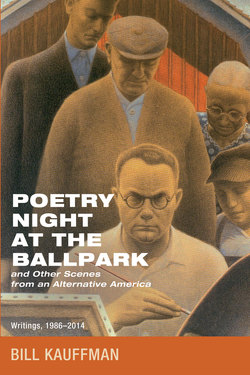Читать книгу Poetry Night at the Ballpark and Other Scenes from an Alternative America - Bill Kauffman - Страница 36
На сайте Литреса книга снята с продажи.
How I Met Eldridge Cleaver
ОглавлениеThe American Conservative, 2012
When I was barely forty I wrote a memoir of sorts (Dispatches from the Muckdog Gazette). I was rather young for that, but one man’s chutzpah is another man’s megalomania. The book cut awfully close to the bone, though to my everlasting gratitude my hometown chose to fete rather than lynch me. I remain astonished.
In writing about the living—maybe the dead, too?—the ideal is bracing honesty tempered by solicitude for the subject’s (or his survivors’) feelings. This ideal is impossible to achieve, so one errs on the side of honesty or human decency—take your pick. Ruth or ruthlessness?
The question came up while reading William Dean Howells’s recollection “My Mark Twain.” The native Ohioan Howells, author of a great American novel (The Rise of Silas Lapham), served as editor of The Atlantic Monthly and dean of post-Civil War American letters, but his posthumous reputation went into an eclipse whose totality occurred when Sinclair Lewis gibed in his Nobel Prize acceptance speech that Howells had “the code of a pious old maid whose greatest delight was to have tea at the vicarage.”
I thought of Lewis’s crack as I read that Howells agonized over whether or not to relate the shocking fact that Mr. Clemens had once been drunk. Howells chose circumspection on the grounds that “to say a man has been drunk is to say a thing from which the reader instinctively recoils.” (Less reticent, Twain remarked of Howells’s chatterbox wife Elinor that when she entered a room “dialogue ceased and monologue inherited its assets and continued the business at the old stand.”)
I don’t want to pick on Howells, whom I read with respect, if not ardency. (Gore Vidal’s appreciation “William Dean Howells” is superb.) Howells lived for a time under the Buckeye Sun in Columbus, as did Phil Ochs, who wrote: “I’ve been all over the country/But I don’t believe I’ve had more fun/Than when I was a boy in Ohio.” (Howells preferred Boston, but to each his idyll.)
William Dean Howells was a friend of Twain’s and others he profiled; for the most part, I have been not friend but interlocutor of the almost famous, which carries a less burdensome set of obligations. I’ve been lucky to have conducted lengthy Q&A’s with several dozen writers and politicians and historians and even football coaches (Joe Paterno: I liked him, so no Sandusky jokes) over the last quarter century.
The only person I’ve ever interrogated while he was in his cups was my old boss Pat Moynihan, during a memorably bibulous lunch shortly before his death. Among my favorite interviewees was novelist and Civil War epicist Shelby Foote. I showed up at his stockbroker-Tudor home in Memphis about noon. Foote, long-haired, wearing ratty pajamas, answered the door and drawled, “Ah wuz jes’ fixin’ ta go ta thuh whiskey stoah.” He had more cool in one grey hair than every Southern expatriate writer in Manhattan combined.
My first interview was back in 1985, when Lynn Scarlett, an engaging New Leftist who wound up in G.W. Bush’s subcabinet, and I traveled to Berkeley to spend the day chatting with Black Panther Eldridge Cleaver for Reason. When Eldridge—a loquacious and fascinating guy—got up to take a whizz, we glanced at his files. The two I remember were devoted to “Sperm” and whether Jim Morrison was extant or extinct.
I also interviewed a one-time Panther sympathizer, Clarence Thomas, who impressed me as friendly and intellectually curious. I liked the Booker T. Washington-Marcus Garvey-Malcolm X self-help streak in Thomas, then EEOC chairman.
Ted Kennedy later used that interview in the Thomas hearings to paint the nominee as a radical libertarian. If only! (In fairness, Senator Kennedy was kind to me when as a callow legislative assistant I had to explain to him some long-forgotten—and surely profligate—amendment. The two most polarizing members of the 1980s Senate—Ted Kennedy and Jesse Helms—were so much more genial than abrasive “moderate” jerks such as Lowell Weicker, Joe Biden, and Arlen Specter.)
My single-day round trip record was to and fro San Angelo, Texas, where I had lunch with Elmer Kelton, whose The Time it Never Rained is among the finest Western novels. We went to a steakhouse, San Angelo being cattle country. I have very few eccentricities—ask my wife!—but I disdain forks. For an instant I considered whether to eat that steak with knife and spoon, but I took one for the tine.
I have many more interview memories, but nothing as scandalous as Samuel Clemens getting tipsy. I suppose I should hustle over to the vicarage. Maybe via the whiskey stoah.
